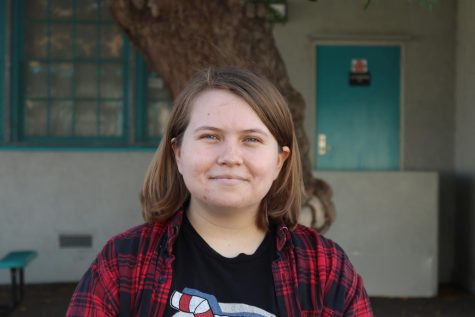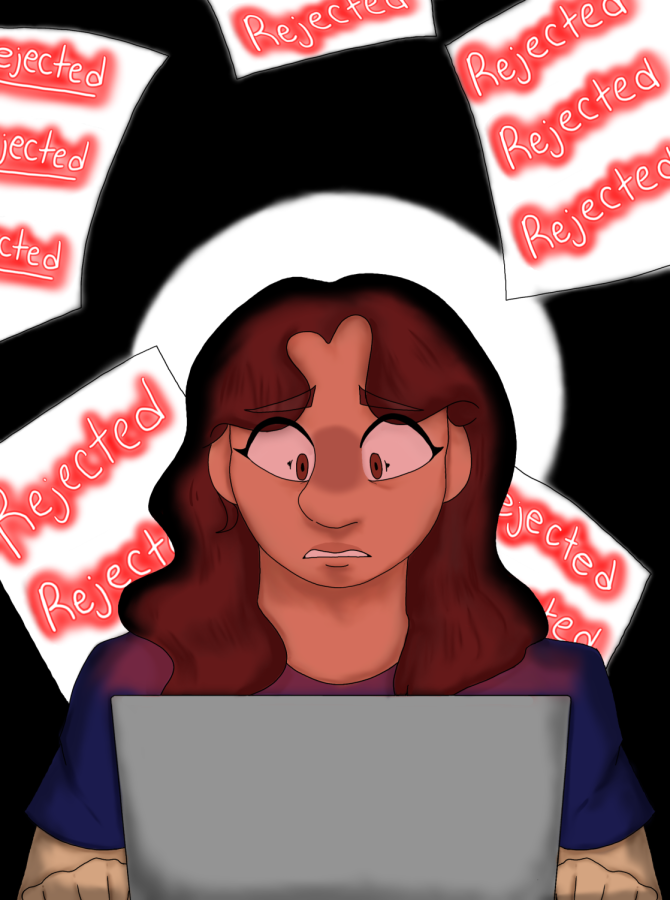The college admissions process is flawed
College acceptance rates are decreasing due to a large influx of applicants in the last few years. As a result, the self-esteem of high school seniors has plunged.
I’ve dreamt of going to college for as long as I can remember. I, and thousands of other high school seniors, have worked for four long years to get into a top college. I’ve done numerous extracurricular activities, held countless leadership positions and maintained a high GPA. I felt confident and secure with my intelligence and skills sets. But a single sentence from a college decision can make you feel as if your entire world just fell apart:
“After careful consideration of your application, we are unable to offer you admission…”
This year alone, 1,2 million students applied to United States private universities through the Common Application, which excludes public universities. With a large influx of students applying to universities, acceptance rates have declined, scandals within the college admissions process have arisen, and the self-esteem of high school seniors has plummeted. It’s safe to say that the college decision process is flawed.
I’ve committed to UC Berkeley with an 11.4% acceptance rate. To put into perspective how low acceptance rates have become, the acceptance rate at UC Berkeley was 20.8% just 10 years ago. The acceptance rates of most American universities have plummeted due to a large pool of applicants, and many students are left heartbroken and rejected. It’s difficult to pinpoint why a student was rejected from a university, with the admissions office never giving feedback on why they made that decision. Universities put out rubrics on the type of students they look for, allowing many applicants to follow their criteria. Still, many are rejected without explaining what they did wrong in their application, leaving students with self-doubt and low self-esteem.
Even some students who were interviewed for the New York Times in “Harvard or Happiness? 11 High School Seniors Debate College Rankings,” have expressed their concerns about the stress of college applications and the emotional toll of wanting to go to a top college. Many of the students stated they want to go to college to experience independence, gain experience for their career choices, and meet new people. Still, they all worry about their mental health when going to college.
With that said, facing rejection can be a good learning experience for all prospective college students as they learn how to become accustomed to it when experiencing life outside of school. The power of rejection allows people to use critical thinking skills to regather their choices, have a stronger will, and have more control over their emotions. Yet, college rejections don’t allow this to happen, with no advice on what they had done wrong and no time to grow in the meantime of the decision season.
Big universities claim to look for applicants with excellent applications. Yet, with admission bribes scandals making national headlines, it seems these days a good application is just a mere factor in how far you can go in higher education. The college decision process must be fair to all applicants, no matter their race, socioeconomic status, gender, or orientation, which is something many universities are failing to see.
If we want our generation to succeed in obtaining higher education, we must eliminate bias within the admissions process and expand the number of students at different universities. Everyone deserves a chance to enter university, whether someone comes from a lineage of college-educated or is the first in their family to go to college. Acceptance rates are plummeting due to a large number of applicants, but this shouldn’t have to happen. If various universities can expand their freshman classes, everyone will be able to fulfill their right to an education.
While criticizing the college decision process, I’m still excited about college. I cannot wait to experience independence while studying what I’m passionate about. After shedding many tears, I have the strength to look back on the month of March and realize: the college decision process is flawed. But it doesn’t have to be if we can look past biases and open doors to a bigger audience of students who want to continue their education.

Senior Emily Short is starting their first year as a Yearbook editor after a year of being a staff writer. While they are a bit nervous to be on the yearbook...












